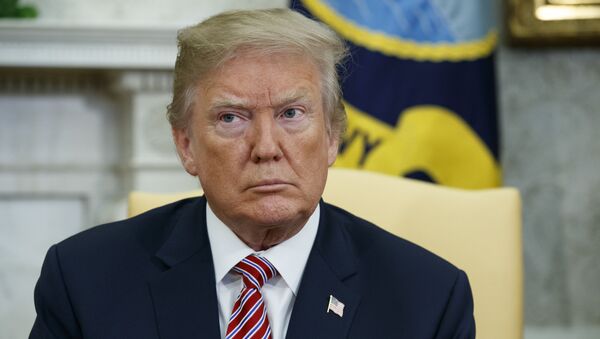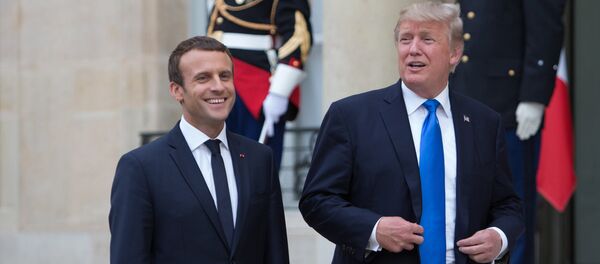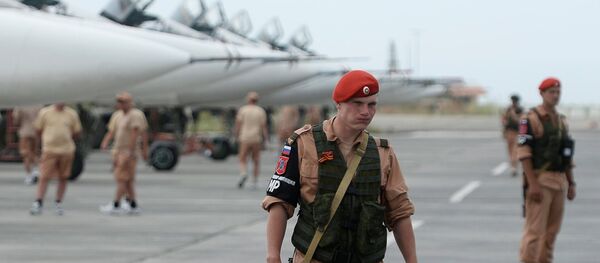Last week, several media outlets reported, citing militants, that Damascus had dropped a chlorine bomb on Douma, which allegedly claimed up to 70 lives. While the United States has held the Syrian authorities accountable for the alleged attack, Bashar al-Assad's government has vehemently dismissed the allegations, insisting that the entire incident was staged.
READ MORE: Trump Cancels Trip to Latin America to Focus on Response to Syria — White House
According to the New York Times, Donald Trump and his advisers have been discussing a military response to the purported attack, with national security officials voicing their concerns that launching an attack of the same scale as last year’s strike on Syria's Shayrat airbase in response to the alleged sarin gas attack in Idlib would prove ineffective at halting Damascus.
At the same time, US authorities are not disclosing the details of the potential military response, however, Trump has recently spoken with several world leaders, including French President Emmanuel Macron, Qatari Emir Tamim bin Hamad Al-Thani, UK Prime Minister Theresa May, and agreed not to allow chemical weapons to be used in Syria. It remains unclear whether any of Trump’s allies will take part in the strikes.
READ MORE: Khan Sheikhoun to Skripal Case: How US is Playing Chemical Card Against Russia
Earlier, the US Navy had announced its decision to deploy the USS Harry S. Truman Carrier Strike Group to the Middle East, along with the guided-missile cruiser USS Normandy and destroyers USS Arleigh Burke, USS Bulkeley, USS Forrest Sherman and USS Farragut. While the Navy has described the move as a “planned redeployment,” it came shortly after Washington had accused Damascus of using chemical weapons.
Possible Targets of US Strikes
According to the recent report by Turkish media outlet Yeni Safak, citing International Relations scholar Zakariye Molahafci, the US has designated 22 top targets on Syria’s territory. The targets are reportedly located in the province of Homs, as well as near Russian naval facility in Tartus, where Russian servicemen are currently deployed.
READ MORE: Does Presence of White Helmets Indicate False Flag Chemical Attacks in Syria?
The news agency has suggested that the United States, the UK, France and Israel will carry out coordinated airstrikes against Syria, paying particular attention to military airbases in Homs, Damascus, Tartus, Hama, Deir ez-Zor, Raqqa and Al-Hasakah. The allies will reportedly use land, sea and air missiles to attack Syria
"The eradication of the regime’s air defense systems would shift the balances," said Molahafci, adding that such an offensive would strike a major blow to Assad’s forces.
False Flag Chemical Attack in Douma
Washington is weighing a military response after several media outlets reported, citing militants, that the Syrian authorities had used chemical weapons against civilians in the city of Douma in Eastern Ghouta, with the infamous White Helmets posting unverified pictures and videos allegedly showing the aftermath of the chlorine gas attack. Mainstream media immediately picked up the story, with some reporting that up to 70 people had died of “widespread suffocation.”
READ MORE: White Helmets 'Treat' Alleged Chemical Attack Victims Without Protective Gear
The United States immediately accused Damascus of the attack, claiming that the Syrian government, who has a “history” of using such weapons, was “not in dispute.” President Trump held a phone conversation with his French counterpart, having “exchanged data” allegedly confirming the weapons’ use in Douma, and then made another call to Theresa May to discuss the issue. The three leaders have agreed to cooperate closely with international partners to hold the perpetrators accountable.
Meanwhile, Syrian officials have denied the allegations, arguing that the chemical attack was staged by terrorists, and the government did not need such measures to curb the militants, as the armed forces had nearly liberated Douma.
“As the Defense Ministry has already pointed out, the Russian military bases in Hmeymim and Tartus are under firm protection. At the same time, we expect that in the event of US strikes, if any, the lives of our servicemen will not be in danger. I think that the United States understands this and will not allow it, because otherwise Russia's response will be immediate, as the chief of the Russian General Staff has said," Yevgeny Serebrennikov, first deputy chairman of the Russian upper house’s Defense Committee told Sputnik.
Meanwhile, the Russian Reconciliation Center has spoken with doctors in the town, as well as the Syrian Red Crescent, who reported that they had not received any patients with signs of chemical poisoning.
UNSC Rejects Russian Resolution Supporting OPCW Mission in Douma
The 15-member United Nations Security Council has voted against Russia’s draft resolution to launch a fact-finding mission by the Organization for Prohibition of Chemical Weapons (OPCW) in Syria; while Russia, China, Kazakhstan, Bolivia and Ethiopia voted for, the US, France, the UK and Poland voted against. Other members of the UNSC abstained from voting.
READ MORE: UN Security Council Meeting Over Syrian Crisis (VIDEO)
April 2017 Shayrat Missile Strike
A year ago, Trump ordered the launch of 59 Tomahawk cruise missiles on Syria’s Shayrat military base in response to another unverified chemical attack, when his daughter Ivanka, “heartbroken and outraged,” showed pictures of babies allegedly affected by sarin gas used by Bashar al-Assad.
Tonight I ordered a targeted military strike…… pic.twitter.com/3nUzrdiGzX
— President Trump (@POTUS) 7 апреля 2017 г.
On April 4, 2017, media reported, based on data provided by the White Helmets, that a chemical attack in the town of Khan Sheikhoun in Idlib province which killed 80 people and injured over 300 – the incident was blamed on Damascus, which consistently denied the accusations, saying that the government could not use chemical weapons, because it had one, as was confirmed by the OPCW.




